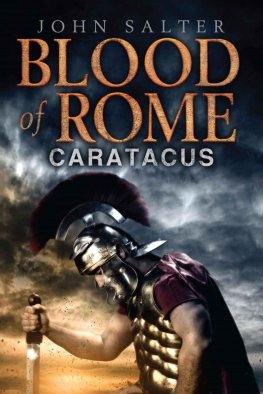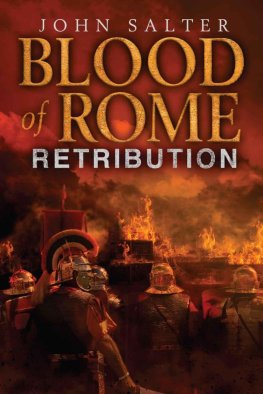John Salter - Caratacus
Here you can read online John Salter - Caratacus full text of the book (entire story) in english for free. Download pdf and epub, get meaning, cover and reviews about this ebook. year: 2013, publisher: John Salter, genre: Adventure. Description of the work, (preface) as well as reviews are available. Best literature library LitArk.com created for fans of good reading and offers a wide selection of genres:
Romance novel
Science fiction
Adventure
Detective
Science
History
Home and family
Prose
Art
Politics
Computer
Non-fiction
Religion
Business
Children
Humor
Choose a favorite category and find really read worthwhile books. Enjoy immersion in the world of imagination, feel the emotions of the characters or learn something new for yourself, make an fascinating discovery.
- Book:Caratacus
- Author:
- Publisher:John Salter
- Genre:
- Year:2013
- Rating:5 / 5
- Favourites:Add to favourites
- Your mark:
- 100
- 1
- 2
- 3
- 4
- 5
Caratacus: summary, description and annotation
We offer to read an annotation, description, summary or preface (depends on what the author of the book "Caratacus" wrote himself). If you haven't found the necessary information about the book — write in the comments, we will try to find it.
Caratacus — read online for free the complete book (whole text) full work
Below is the text of the book, divided by pages. System saving the place of the last page read, allows you to conveniently read the book "Caratacus" online for free, without having to search again every time where you left off. Put a bookmark, and you can go to the page where you finished reading at any time.
Font size:
Interval:
Bookmark:
John Salter
Caratacus
Chapter One
It was almost the middle of summer AD 43, when a vast fleet set sail from Gesoriacum in Gaul for the distant shores of Britannia. The Emperor Claudius had spent the last two years planning for this enterprise to finally conquer the land that had not once but twice repelled the great General Julius Caesar and his own legions. Claudiuss predecessor, the insane and unpredictable Caligula, had also embarked on an invasion but had been killed by his own Praetorian guard before his plans were allowed to come to fruition.
The Senate and the legions had been humiliated when instead of setting sail across the channel, Caligula had briefed his army on the shoreline of Gaul and ordered them to collect pebbles, shells and stones and to launch them as missiles into the sea. He then claimed victory over Britannia but before redeploying his forces elsewhere, instructed them to build a lighthouse from the pebbles on the beach. This was his monument to celebrate the victory over the Britons after which, his legions were dispersed around the Empire to the astonishment of the Senate.
The Praetorian Guard knew that if Romes fortunes were to grow and her full potential was to be realised, Caligula would have to die and a more astute and clear minded leader take his place. Now a little over two years after his death, the huge fleet of nearly one thousand vessels blanketed the water as they slowly made their way across the channel to the distant island. A land where its warriors were known to use chariots for war, make human sacrifice to their gods and fight almost naked in battle, men and women alike.
Despite the conflicts with Caesar previously, an uneasy peace had settled between the Empire and some regions of Britannia, trading eventually grew with tribes willing to exchange goods, materials and livestock. However, nearly a hundred years later after Caesar, Claudius saw that he had an ideal opportunity to gain favour with the masses of Rome, the Senate and the army and knew that a victory over Britannia would boost his popularity.
He had finally decided that it was time that the primitive barbarians known as Britons, were brought to heel under the boots of the Empire. Some tribes had already received promises of neutrality and peace; the agreement not to resist was rewarded with gold and further pledges of wealth and client Kingdoms in what would be the next Province.
Unhappy with the dominance of the most powerful tribal regions controlled by the Catuvellauni in the south and east of the country, a few lesser chieftains even pledged to fight alongside Roman forces, Briton against Briton. A few nobles also saw an opportunity to elevate themselves and swore their loyalty to the Emperor after defecting completely or after being exiled. Most notably Adminius, son of the King of the Catuvellauni, Cunobelinus and brother to Caratacus, changed his allegiance to Rome after being exiled by his own father.
Cunobelinus had ruled these lands all his life as had his father and grandfather before him. His ancestors had even fought Caesars great armies and helped send them home but as time went by treaties were drawn up and trading was established. The power hungry Adminius had broken treaties by raiding other lands and had argued that his father should ally himself fully with Rome against other Britons. His father had refused exiling him to Gaul naming Togodumnus, another son, his successor. Adminius completed his defection fully by seeking the assistance of the Emperor, with his aid he intended to return to his rightful land where he would cooperate with Romes wishes as a client King, after the death of his brother Togodumnus and all others who stood against him.
The vessels of the fleet now moved like a giant shadow covering the sea before them. Hundreds of dots from a distance seemed to merge into one enormous entity, appearing to change the colour of the blue water, black and white, the colours of the dark wood of their hulls and white of their sails. All was not well aboard the vessels however, as rumours had spread throughout the army that the campaign ahead was cursed and likely to be the most difficult the soldiers had ever encountered. They were told that death and destruction awaited them in the lands that lay across the water.
To the common soldier, the inhabitants who were to be their enemy were barbarians, said to infest the enormous island, living in tribal conditions in little more than mud huts and fighting against each other as they had for decades and centuries before. Since Roman explorers and envoys had first set foot on the land, it had always been a target on the Empires north western frontier. Britannia had lay waiting, unconquered and divided by warring chieftains for a ruler who would unify the tribes.
Near rebellion had spread like disease through the ranks of the men aboard the ships and a mutiny had narrowly been averted right up until the last few days before departure. The soldiers knowing that even the great Caesar had failed to capture the land were superstitious enough to believe that Britannia could not be conquered. Stories were rife in the legions that the inhabitants had used demons and magic to destroy Caesars army, many of whom were drowned at sea by serpents during vicious storms. It was after all an island at the edge of the known world, where all manner of strange creatures and magic were said to exist.
Mysticism was rife throughout the Empire and in the streets of its pagan cities where soothsayers could be found in back streets plying their trade and divining the future. Animal entrails from sacrificed animals were studied to identify a persons future fortunes as well as pledges to all manner of gods. Pagans were very superstitious and if any sign was deemed to be a bad omen, word of its existence would spread like fire and it would be avoided at all costs.
Long before the invasion, the Britons had been told of the large force gathering in Gaul and under the leadership of Togodumnus, had amassed a huge army of over one hundred thousand warriors to greet them on their shores. Chieftains and their war bands had been recruited from all over the south from all those regions willing to fight. They had waited for weeks whilst their families tended crops and cared for their livestock at home.
However, just as Spring had begun that year when the fleet was originally due to set sail, superstition took hold of the campaigning legions and despite all the efficient organisation and planning of General Aulus Plautius Silvanus, the overall commander, his men were now reluctant to take part in the war. Stories were repeated from one soldier to the next of the unimaginable horrors that awaited them and they refused to board the ships.
Plautius sent word to Rome of the delay and Claudius dispatched his own chief of staff, Narcissus to deal with the matter. He travelled to the port to resolve the problem with promises of riches for all those who took part in the campaign. Upon his arrival at the camp Plautius called an assembly where he and Narcissus stood on a raised dais, he began to address the assembled legions. However, before Narcissus could repeat the Emperors promise of wealth, he was shouted down and ridiculed as the men knew he was a former slave and now merely a freedman and therefore not a true Roman in their eyes.
Narcissus was jeered and began to quickly leave the platform to laughter and cheers from the gathered men who shouted insults, Hooray for the Saturnalia, referring to when slaves could actually wear the same clothes as their masters in late December every year. Narcissus reddened clearly embarrassed and humiliated by their words, turned to the General, rage building in his face. Plautius also angered by his mens behaviour, furiously shouted for order and demanded quiet from those assembled.
Font size:
Interval:
Bookmark:
Similar books «Caratacus»
Look at similar books to Caratacus. We have selected literature similar in name and meaning in the hope of providing readers with more options to find new, interesting, not yet read works.
Discussion, reviews of the book Caratacus and just readers' own opinions. Leave your comments, write what you think about the work, its meaning or the main characters. Specify what exactly you liked and what you didn't like, and why you think so.












![James Salter - A sport and a pastime : [a novel]](/uploads/posts/book/43559/thumbs/james-salter-a-sport-and-a-pastime-a-novel.jpg)